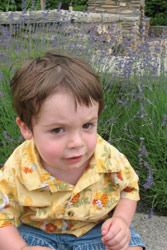Lavender oil has been poured into baths and rubbed between wrists since Tut was a boy. But it took a handful of millennia for the celestial aroma to finally achieve mainstream success. When Johnson’s baby products introduced its popular Bedtime line a few years back, the world’s most multitasking botanical extract had finally officially arrived.

“Dreamland awaits. … A nightly routine that includes a warm bath using [Bedtime products] is clinically proven to help babies fall asleep easier and sleep through the night better,” a passage on www.johnsonsbaby.com promised exhausted new mothers.
Never mind that the admittedly soothing scent issuing from those pale-purple bottles is ersatz: Even laboratory lavender has the power to lull cranky newborns. Most parents who bought into the Bedtime hype (I was not immune) never went back to using Johnson’s standard, classic yellow stuff.
However, aromatherapist Joie Power gently cautions against the use of synthetic lavender. “True essential oil has so much more of a pleasant scent,” says Power. (The former owner of Dreaming Earth Botanicals, a local essential-oil manufacturer, Power used to purchase her raw ingredients from the world lavender capital: France’s Provence region.)
“But the real point of using pure oil of lavender is because it delivers very distinct therapeutic properties,” she continues. Anyone who’s ever been massaged with lavender oil can attest to its effectiveness in relieving stress. But it’s also known to be “antiseptic, antispasmodic and anti-inflammatory,” notes Power, adding, “It’s one of the few essential oils you can apply undiluted to the skin.”
Power, who holds a Ph.D. in neuropsychology, uncorks some intriguing trivia about lavender’s seemingly miraculous medicinal properties. “Throughout the Middle Ages, it was believed people who worked in lavender distilleries did not get the plague nearly as much,” she reveals. “And it is antivenomous. In India, they use lavender to treat cobra bites.”
Appreciation for the plant’s rich color traces back at least to gladiator days: “Royal purple” robes were often tinted with lavender extract, and early American settlers made similar use of it. Hence lavender’s inclusion in The North Carolina Arboretum’s Heritage Garden, a showcase of functional botanicals.
“Parts of the lavender plant were used in dye-making,” confirms Cori Frost, who heads up an arboretum garden crew. She makes no mention, however, of the practical plant’s heady scent or whimsical loveliness when viewed en masse.
But Annie Clausen, who manages a 24-acre lavender, blueberry and dairy-goat farm up in Burnsville, has lately been immersed in what she calls a “pretty intoxicating” sensory experience.
Growing lavender—which thrives on hills but hates dampness and is easily ruined by mold—can be pretty hard work. Yet Clausen’s calm cheer suggests that her daily inhalation of the stuff may have influenced her demeanor.
“When it’s blooming”—which is now—“it’s really quite something,” she says amiably. Not that the relaxing scent has hampered productivity on the farm. In fact, Clausen’s bosses—Mountain Farm owners Jerry and Marilyn Cade—have spun their love of lavender into a cottage industry. The plants outline a popular meditation labyrinth on the property and are bottled into retail bath products, including the Cades’ signature Lavender Babies line for newborn skin. Mountain Farm also sells culinary lavender in the form of teas, honey and vinegar, taking advantage of the plant’s current popularity in high-end cuisine.
“Cooking magazines recommend using lavender in desserts and in lamb and other meats,” says Clausen. But she cautions that “there’s a very fine line when using culinary lavender. Used right, it’s a neat new flavor; too much and it tastes medicinal.”
Lavender Festival info
The third annual Lavender Festival happens Saturday, July 5, and Sunday, July 6, at Mountain Farm in Burnsville, from 10 a.m. to 5 p.m. Activities will include crafts and cooking with lavender, garden tours and cultivation tips, essential-oil extraction, goat-milking demonstrations, blueberry picking and live music. Massage therapists and food vendors will be on hand. Admission is $5/person. For more information or directions to the farm, visit www.mountainfarm.net or call 675-4856.
The themed workshops at Mountain Farm’s upcoming Lavender Festival should prove safe for the lay enthusiast. Participants will learn to fashion lavender wands, sachets and wreaths. And if that effusion of blooming beauty should bring any attendees to their knees, well, Mountain Farm also specializes in hosting “lavender weddings” complete with the requisite purple bouquets.
Marriage may or may not be forever. But for her part, Power has no qualms about proclaiming a lasting love. “There’s not much lavender is not good for,” the aromatherapist declares. “I always tell my students, if I could pick one essential oil for the rest of time, lavender would be my choice.”
[Melanie McGee Bianchi is an Asheville-based writer, editor and beginning gardener. Her basil could use some help.]



Before you comment
The comments section is here to provide a platform for civil dialogue on the issues we face together as a local community. Xpress is committed to offering this platform for all voices, but when the tone of the discussion gets nasty or strays off topic, we believe many people choose not to participate. Xpress editors are determined to moderate comments to ensure a constructive interchange is maintained. All comments judged not to be in keeping with the spirit of civil discourse will be removed and repeat violators will be banned. See here for our terms of service. Thank you for being part of this effort to promote respectful discussion.